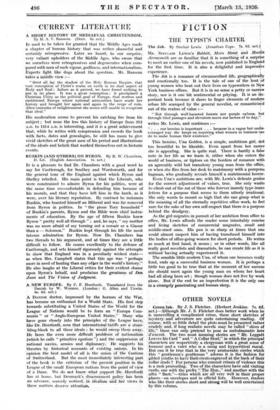FICTION
THE TYPIST'S CHARTER
Arrozesmith are so familiar that it is something of a surprise to meet an earlier one of his novels, now published in England for the first time. It is also a delightful and impressive experience. The Job is a romance of circumscribed life, geographically and emotionally too. It is the tale of one of the host ;of young women who beat out their lives on typewriters in New York business offices. But it is in no sense a petty or narrow story, nor is it one bit sentimental or pitying. It is an *- portant book because it dares to finger elements of modern urban life stamped by the general novelist, or romanticized out of the realms of value :-
" Not through wolf-haunted forests nor purple talon, but through tiled passages and elevators move our heroes of to-day,".
writes Mr. Lewis, and continues :—
. . . our heroine is important . . . because in a vague but undie. couraged way she keeps on inquiring what women in business can dci to make human their existence."
This heroine, Una Golden, is a simple, ambitious girl, not too beautiful to be likeable. Even apart from her career she is appealing. She is quite real. There is hardly a false note in her life as we learn it, either when she enters the world of business, or tiptoes on the borders of romance with an agreeably wild but transitory young man from the office, or when she flies from her desk to matrimony with a pompous bagman, who gradually reveals himself a matrimonial horror. Even Una's ambitions are, with Mr. Lewis's delicate genius for the correct adjustment of values, true. She only wants to climb out of the rut of those who forever inanely type inane letters for a purpose that seems to them utterly irrational.
She only wants to mount so high that she ean grasp what is the meaning of all the eternally repetitive office work, to feel
sure for the sake of her own self-respect that there is a purpose behind the drudgery.
As the girl migrates in pursuit of her ambition from office to office, Mr. Lewis affords the reader some inimitably concise and living sketches of commercial magnates, small and middle-sized ones. His pen is so sharp at times that one could almost suspect him of having transfused himself into the bodies of office-going women for short periods. He writes so much at first hand, it seems ; or in other words, like all really good novelists and dramatists, he can create life as it is without' having actually experienced it.
The sensible little modern Una, of whom one becomes really
fond, -ends up. a successful business woman. It is perhaps a little too good to be true that at the moment of her success
she should meet again the young man on whom her heart had all along been set ; though woman does not live by work alone. But if the end be an imperfection it is the only one in a strangely penetrating and human story.






























































 Previous page
Previous page